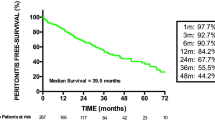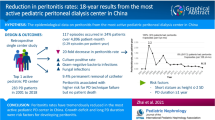Abstract
Background
Peritonitis is one of the major complications of peritoneal dialysis (PD). Although several reports have indicated seasonality of peritonitis, the observation periods were short, and there were no reports from Japan. Therefore, the purpose of this study was to investigate the long-term seasonality of peritonitis in a single institution in Japan.
Methods
Of 126 patients who started PD in our hospital between January 1, 2009, and December 31, 2018, 25 patients (15 men, 10 patients with diabetes) developed peritonitis with a total of 42 episodes. The median age at onset was 63 years, and the median duration from the start of PD to the onset of peritonitis was 22 months.
Results
The 10-year incidence of peritonitis was 0.12 episodes per patient-year. Compared with the reference season of winter (December–February), the incidence rate ratios (95% confidence interval) for spring (March–May), summer (June–August), and autumn (September–November) were 1.75 (0.65–4.75), 1.56 (0.57–4.31), and 2.42 (0.94–6.23), respectively. In addition, no seasonality of Gram-positive and Gram-negative organisms was observed.
Conclusion
No seasonality was evident in the incidence of PD-related peritonitis in our hospital over a 10-year period. These findings suggest that the development of peritonitis in Japanese PD patients is not affected by seasonality.


Similar content being viewed by others
References
Ghali JR, Bannister KM, Brown FG, Rosman JB, Wiggins KJ, Johnson DW, et al. Microbiology and outcomes of peritonitis in Australian peritoneal dialysis patients. Perit Dial Int. 2011;31:651–62.
Boudville N, Kemp A, Clayton P, Lim W, Badve SV, Hawley CM, et al. Recent peritonitis associates with mortality among patients treated with peritoneal dialysis. J Am Soc Nephrol. 2012;23:1398–405.
Nakao M, Yamamoto I, Maruyama Y, Morishita M, Nakashima A, Matsuo N, et al. Risk factors for encapsulating peritoneal sclerosis: analysis of a 36-year experience in a University Hospital. Nephrology (Carlton). 2017;22:907–12.
Kerschbaum J, König P, Rudnicki M. Risk factors associated with peritoneal-dialysis-related peritonitis. Int J Nephrol. 2012;2012:483250.
Chan MK, Chan CY, Cheng IK, Ng WS. Climatic factors and peritonitis in CAPD patients. Int J Artif Organs. 1989;12:366–8.
Alves FR, Dantas RC, Lugon JR. Higher incidence of catheter-related infections in a tropical climate. Adv Perit Dial. 1993;9:244–7.
Quinn MJ, Hasbargen JA, Hasbargen BJ. When does peritonitis occur? Perit Dial Int. 1994;14:172–4.
Kim MJ, Song JH, Park YJ, Kim GA, Lee SW. The influence of seasonal factors on the incidence of peritonitis in continuous ambulatory peritoneal dialysis in the temperate zone. Adv Perit Dial. 2000;16:243–7.
Szeto CC, Chow KM, Wong TY, Leung CB, Li PK. Influence of climate on the incidence of peritoneal dialysis-related peritonitis. Perit Dial Int. 2003;23:580–6.
Cho Y, Badve SV, Hawley CM, McDonald SP, Brown FG, Boudville N, et al. Seasonal variation in peritoneal dialysis-associated peritonitis: a multi-centre registry study. Nephrol Dial Transplant. 2012;27:2028–36.
Núñez-Moral M, Sánchez-Álvarez JE, González-Díaz I, Peláez-Requejo B, Quintana-Fernández A, Rodríguez-Suárez C. Seasonal variations and influence of the weather on the appearance of peritoneal infection. Nefrologia. 2014;34:743–8.
Buttigieg J, Borg Cauchi A, Rogers M, Farrugia E, Fava S. Seasonal variation in the peritoneal dialysis-related infections: a single center experience in the Mediterranean. Ther Apher Dial. 2016;20:501–6.
Wadhwa NK, Reddy GH. Exit-site care in peritoneal dialysis. Contrib Nephrol. 2007;154:117–24.
https://www.data.jma.go.jp/obd/stats/etrn/index.php?prec_no=46&block_no=47670&year=&month=&day=&view=. Accessed 6 Jun 2020.
Sakurada T, Okamoto T, Oishi D, Koitabashi K, Sueki S, Kaneshiro N, et al. Subcutaneous pathway diversion for peritoneal dialysis catheter salvage. Adv Perit Dial. 2014;30:11–4.
Li PK, Szeto CC, Piraino B, de Arteaga J, Fan S, Figueiredo AE, et al. ISPD peritonitis recommendations: 2016 update on prevention and treatment. Perit Dial Int. 2016;36:481–508.
Shapiro RS, Cowen LE. Thermal control of microbial development and virulence: molecular mechanisms of microbial temperature sensing. Bio. 2012;3:e00238–312.
Author information
Authors and Affiliations
Corresponding author
Ethics declarations
Conflicts of interest
All the authors have declared no competing interest.
Research involving human participants and/or animals
This article does not contain any studies with animals performed by any of the authors.
Ethical approval
All procedures performed in studies involving human participants were in accordance with the ethical standards of the institutional and/or national research committee at which the studies were conducted (IRB approval number 4667) and with the 1964 Helsinki declaration and its later amendments or comparable ethical standards.
Informed consent
Informed consent was not necessary because of the retrospective nature of the study. Thus, the need for individual written informed consent was waived. However, a declaration of data was published on the website. The study information was published on the internet, since patients could use the official department websites to opt-out of the study if they did not want the data used for research purposes.
Additional information
Publisher's Note
Springer Nature remains neutral with regard to jurisdictional claims in published maps and institutional affiliations.
About this article
Cite this article
Sakurada, T., Fujishima, R., Yamada, S. et al. Seasonality of peritoneal dialysis-related peritonitis in Japan: a single-center, 10-year study. Clin Exp Nephrol 25, 52–57 (2021). https://doi.org/10.1007/s10157-020-01953-1
Received:
Accepted:
Published:
Issue Date:
DOI: https://doi.org/10.1007/s10157-020-01953-1




